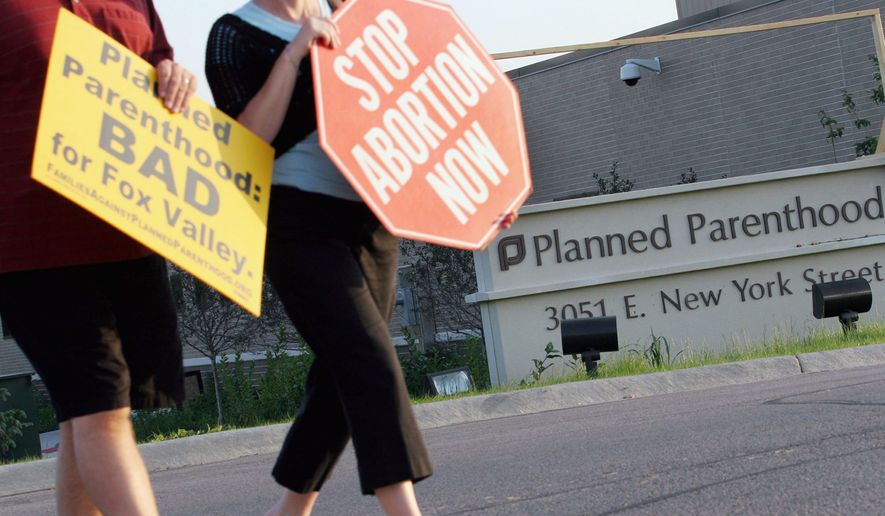Federal taxpayer funding generally isn’t allowed to be spent on abortions, but Republicans say they have spotted a loophole in which tax-free municipal bonds have been used to put federal cash on the line in order to help build abortion clinics — including Planned Parenthood’s headquarters in New York.
Rep. Robert Pittenger, North Carolina Republican, will introduce legislation this week aimed at stopping what he called “abortion bonds.” He said it’s time to make the law agree with the principle that taxpayers shouldn’t be on the hook in any way for the procedure.
“We’re utilizing the federal government to facilitate the development of these abortion clinics through the involvement of the American taxpayer, and they don’t want that,” Mr. Pittenger said.
Under current law, known as the Hyde Amendment policy, taxpayer funding is supposed to be limited to abortions in extreme cases of rape, incest or danger to the mother’s life.
That prohibition generally covers Medicaid and other government-funded health care programs, but Mr. Pittenger said it also should cover areas where taxpayer money goes to subsidize abortion providers. He said construction of abortion clinics with publicly backed financing is one of those areas.
Complete data are unavailable, but congressional investigators and pro-life groups say Planned Parenthood clinics in Illinois, Florida and in the Upper Midwest used bonds issued by local authorities and backed by the federal tax exemption to fund construction. A clinic in Massachusetts also may have been funded by bonds issued from the state’s economic development agency.
Planned Parenthood Federation of America’s headquarters in New York has also benefited from two tax-exempt bond issues, according to the organization’s public financial audit and documents from the financiers. One of those was a $30 million loan in 2011 from Wisconsin’s Public Finance Authority revenue board.
Planned Parenthood Federation of America didn’t respond to email and phone messages seeking comment on the use of bonds to fund clinics or the effort to stop the practice.
Tax-exempt municipal bonds are issued by states and localities and are generally used for public works projects such as roads, schools, bridges and hospitals. Interest payments are tax-exempt and deemed secure, which make them attractive for investors — meaning lower interest rates.
That ends up saving money for those involved in the project, particularly when it’s a sports stadium or, in this case, an abortion clinic.
Overall, the federal government lost $29 billion in revenue in 2014 to exempt bonds, according to the Tax Policy Center.
Planned Parenthood facilities are an infinitesimal fraction of that total, but the principle at stake, Mr. Pittenger said, is the use of taxpayers’ money.
“The intent is to close a loophole in the tax code that allows for them to finance their clinics,” he said.
Mr. Pittenger has already earned the support of major pro-life advocacy groups, including Americans United for Life, the Susan B. Anthony List and National Right to Life.
Jennifer Popik, director of federal legislation at National Right to Life, said Americans would be surprised to learn that abortion providers’ access to federal assistance goes beyond collecting money from Medicaid or other health care programs, and even touches the tax code.
“This is a good small step here,” she said of the Pittenger legislation. “This isn’t defunding Planned Parenthood, this isn’t defunding large abortion providers, but this is one thing we can show we’re moving in a positive direction.”
The Supreme Court in 1980 ruled the Hyde policy legal, saying abortion was such an extraordinary procedure, involving the purposeful taking of a potential life, that it made sense to treat it differently from other medical procedures for which Americans might have a right to taxpayer funding.
That doesn’t mean all the issues are settled.
The armed services committees in Congress regularly debate whether allowing women to obtain abortions at overseas military hospitals violates the principles of the Hyde policy.
A fight in federal courts over the past week has questioned whether the government is breaking the Hyde Amendment if it has to transport an illegal immigrant girl in the custody of the Health and Human Services Department to get an abortion.
Mr. Pittenger said his bill is crafted to try to adhere strictly to Hyde principles. The amendment doesn’t restrict bonds for facilities that provide abortions in the Hyde amendment exceptions of cases of rape, incest or danger to the life of the mother.
Hospitals, even if they do perform abortions, are also exempt from the prohibition because it’s such a small part of their business, he said.
He will offer his bill as a standalone proposal, though he said he hopes Republican leaders will consider incorporating it into the massive tax code overhaul Congress is about to undertake.
• Stephen Dinan can be reached at sdinan@washingtontimes.com.




Please read our comment policy before commenting.